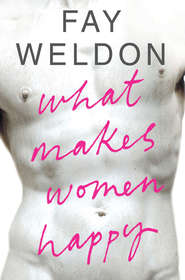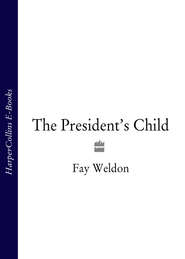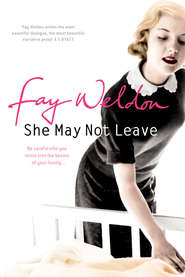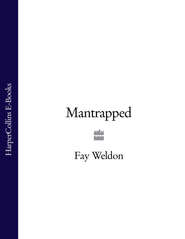По всем вопросам обращайтесь на: info@litportal.ru
(©) 2003-2024.
✖
Watching Me, Watching You
Автор
Год написания книги
2018
Настройки чтения
Размер шрифта
Высота строк
Поля
Watching Me, Watching You
Fay Weldon
A distillation of our times: eleven short stories from this brilliant contemporary writer.‘Watching Me, Watching You’ was Fay Weldon’s first collection of short stories. They vary widely in theme, while remaining avowedly feminist, sometimes bitter, sometimes angry, yet always handled with wit, irony and courage. A sense of sisterhood is one of the most important qualities a woman may possess and its loss, as in one particular story, ‘Alopecia’, can bring tragedy. On the other hand, in ‘Threnody’, a women’s commune can be gently mocked, and the failings of the leading characters are human rather than masculine.Fay Weldon’s observation is always wonderfully acute and ‘Watching Me, Watching You’ is dominated throughout by her humour and intensity of purpose, giving to these stories a marvellous strength and unity.
FAY WELDON
WATCHING ME, WATCHING YOU
Contents
Cover (#u3bc4a586-8029-5714-ad9a-b1ddca305939)
Title Page (#u3efb2ea7-2ccd-531b-ba67-6c7d24c49e14)
Christmas Tree (#ulink_1fcaf676-7ff9-5786-a827-ef716f16b223)
Breakages (#ulink_5f611130-157b-5cbd-b727-a0aa3071e5cd)
Alopecia (#ulink_ec2d68ad-d9ec-5723-8fe8-a4e6a4ae6a0c)
Man with No Eyes (#litres_trial_promo)
Holy Stones (#litres_trial_promo)
Threnody (#litres_trial_promo)
Angel, All Innocence (#litres_trial_promo)
Spirit of the House (#litres_trial_promo)
Watching Me, Watching You (#litres_trial_promo)
Geoffrey and the Eskimo Child (#litres_trial_promo)
Weekend (#litres_trial_promo)
Acknowledgements (#litres_trial_promo)
About the Author (#litres_trial_promo)
Also by Fay Weldon (#litres_trial_promo)
Copyright (#litres_trial_promo)
About the Publisher (#litres_trial_promo)
Christmas Tree (#ulink_dbe0e7d0-219e-58c1-ab8b-a110e7a04399)
The last thing Brian did before he came South was to plant out the Christmas Tree for his Mum and Dad. The tree had grown and flourished for years in the sooty square of Bradford backyard where all other growing things failed, except cabbages. Its needles were dark-green, thick and resilient upon the twig, and its branches grew in conventional Christmas Tree shape. Every year one or other of the Smith family would dig it out on Christmas Eve and replant it on Twelfth Night, and every year the tree repaid them by growing thicker, higher and glossier. Soot clearly suited it. So the tree had existed since 1948, when Brian was ten. Now he was twenty-five. It had given him, Brian worked out on that traumatic day, fifteen years’ worth of pleasurable feelings.
‘Never drops a needle on my carpet,’ said his mother with pride, every year. ‘Not like the ones you buy down the market.’
‘They’re dead before they get to you,’ she would explain, every year. ‘They boil the roots, you know. They don’t want them growing, do they? No profit in that.’
Brian was spending a last Christmas with his Mum and Dad before leaving Bradford for good. There seemed no point in staying. His wife Audrey would not have him back, even though his daughter Helen was born that Boxing Day.
‘I told you no and I meant no,’ said Audrey. ‘I told you if you went with that woman you needn’t think you were coming back, and what I say I mean.’
Meaning what was said was a Northern habit, and in retrospect, admirable enough. At the time, however, it had seemed merely drastic. Audrey had shut him, Brian, the hero of his life, out of the cosy warmth of home; left him out in the cold exciting glitter of the unknown world, and he didn’t know whether to be glad or sorry. His Mum was allowed to visit the new baby, but not his Dad. Audrey made strange distinctions. ‘Pity it’s not a boy,’ said his Mum, cautiously. ‘It’s a funny-looking little thing. But Helen’s a pretty name and time can work wonders.’
The affair with Carlotta had ended. Brian had written a play for the local theatre — his first. It had transferred to London. Carlotta played the lead. Brian had gone down for rehearsals. Audrey had protested. ‘You’ll sleep with her if you go,’ she said. ‘I know you. Too big for your boots.’
That was another Northern crime, being too big for your boots. Almost as bad as having a swelled head, putting on airs or having eyes bigger than your stomach. Brian slept with Carlotta, and the affair lasted for the run of the play. Four months.
‘That’s the way it goes,’ said Alec, his agent, later to be his friend. ‘When actresses say for life they mean ‘til the end of the run. That’s show biz.’
So Brian, who had believed he was a serious writer, and not in show biz, returned bruised and contrite to Bradford, was thrown out by Audrey, stayed with his parents over Christmas, planted out the Christmas Tree, digging the pit wide and deep, spreading the roots to maximise nourishment and minimise stress — ‘That’s the key to that tree’s success,’ said his Dad, this year as every other, ‘taking care of the roots. Careful!’ — and left, for London, all soft-centred harshness and painful integrity, to slam into the soft cultural underbelly of the South. And so he did.
In the year after he left Audrey Brian wrote two stage plays, one musical, four television plays for the BBC and three letters to Audrey. The applause was deafening and prolonged for everything except the letters, which were met by silence, and the silence hurt him more than the applause cheered him.
Writers tend to undervalue those who praise them, or complain that praise is patronising: whilst at the same time feeling aggrieved if they are not praised. They never win the battle with themselves, which is why, perhaps, they go on writing.
The theme of Brian’s work was adoration, almost reverence, of and for the working classes, and his message a howl of hatred for the middle classes, and his solution violence.
‘Wonderful!’ said Alec. ‘The more you insult them the more they’ll love you.’ And in those cosy pre-OPEC days it seemed uncomfortably true. Though that of course was not why Brian chose such themes. The theme — which was something Alec could not or would not understand — chose him. Looking around his middle-class, cheering audience, Brian suffered.
There were, of course, compensations. His words upon the page were simple and direct and attractive; and as he was upon the page, so was he in bed. The girls trailed in and out of his flat and wept when it was all, all over, and for the rest of their lives searched his work for their appearance in it, and frequently found themselves, portrayed not unsympathetically.
‘I don’t know how you do it,’ said Alec, politely. Alec wore bifocals. He was happily married to a good cook, and a prey to romantic love for inaccessible young girls. He, at least, maintained that he was happily married. His wife had another story.
After the fourth letter, Brian forgot Audrey. He asked his parents down to London for first nights, or the taping of his Plays for Today, and they were pleased enough to stay in the grand hotels he booked them into, and his friends seemed genuinely to like them — ‘What a lucky man you are, Brian, to come from a family like that. Real people!’ — and if his parents went back, shaking their heads over him and his rackety life, as if he were a neighbour’s child and not their own, Brian was not there to see it. They would bring him photographs of Helen, and even a father’s kind eye was obliged to observe that she was a plain and puddingy child, and that made her the easier to ignore.
He worried about himself, all the same. Had he lost his roots, forsaken his origins, worse, joined the middle classes? He had an image of himself as the Christmas Tree back home, dug up and not put back, left in its pot, unwatered, living on borrowed time, on the goodness of the past.
‘Do stop going on,’ said Victoria of the green pubic hair and feather boa. ‘I never knew anyone so guilty as you. Can’t you just stop worrying?’
He couldn’t. Victoria left.
‘But you’ve got it all made,’ said Harriet the theatrical twin, or was it Belinda, they played the silliest games, ‘rich and famous, and the revolution just around the corner, and you won’t even be the first to go, like us; but the last. You good little leftie, you.’
They went, pretty soon, to be cooks on someone’s charter yacht, somewhere in the sun. ‘Perhaps I’m having my cake and eating it too,’ he fretted to Lady Ann Scottwell, who had piano legs but wore the shortest of mini skirts, when a less secure girl would have worn trousers, and they somehow managed to make a plus out of a minus, erotically speaking. ‘You might be a little naive about the revolution,’ she murmured into his chest hair, cautiously. ‘Daddy says it definitely isn’t coming.’
That was 1968 and Daddy, it transpired, knew best.
Things went wrong. ‘Violence, dear boy,’ said Alec, who was going through a camp stage, ‘is definitely unfashionable. There’s too much of it about in real life. If things go on as they are, your entire audience will be legless and armless.’
Brian, who nowadays said in public that Alec, in the great school report of life, got good marks for contracts, but bad marks for integrity, tried to take no notice. But he felt confused, as the world changed about him, and goodies became baddies — from Castro to the IRA to Israel and even cigarette smoking became unfashionable. He drank to clear the confusion.
The BBC actually rejected a script and a stage play at the Aldwych was taken off after two weeks. ‘How about a film?’ asked Alec. ‘Hollywood calls.’
Fay Weldon
A distillation of our times: eleven short stories from this brilliant contemporary writer.‘Watching Me, Watching You’ was Fay Weldon’s first collection of short stories. They vary widely in theme, while remaining avowedly feminist, sometimes bitter, sometimes angry, yet always handled with wit, irony and courage. A sense of sisterhood is one of the most important qualities a woman may possess and its loss, as in one particular story, ‘Alopecia’, can bring tragedy. On the other hand, in ‘Threnody’, a women’s commune can be gently mocked, and the failings of the leading characters are human rather than masculine.Fay Weldon’s observation is always wonderfully acute and ‘Watching Me, Watching You’ is dominated throughout by her humour and intensity of purpose, giving to these stories a marvellous strength and unity.
FAY WELDON
WATCHING ME, WATCHING YOU
Contents
Cover (#u3bc4a586-8029-5714-ad9a-b1ddca305939)
Title Page (#u3efb2ea7-2ccd-531b-ba67-6c7d24c49e14)
Christmas Tree (#ulink_1fcaf676-7ff9-5786-a827-ef716f16b223)
Breakages (#ulink_5f611130-157b-5cbd-b727-a0aa3071e5cd)
Alopecia (#ulink_ec2d68ad-d9ec-5723-8fe8-a4e6a4ae6a0c)
Man with No Eyes (#litres_trial_promo)
Holy Stones (#litres_trial_promo)
Threnody (#litres_trial_promo)
Angel, All Innocence (#litres_trial_promo)
Spirit of the House (#litres_trial_promo)
Watching Me, Watching You (#litres_trial_promo)
Geoffrey and the Eskimo Child (#litres_trial_promo)
Weekend (#litres_trial_promo)
Acknowledgements (#litres_trial_promo)
About the Author (#litres_trial_promo)
Also by Fay Weldon (#litres_trial_promo)
Copyright (#litres_trial_promo)
About the Publisher (#litres_trial_promo)
Christmas Tree (#ulink_dbe0e7d0-219e-58c1-ab8b-a110e7a04399)
The last thing Brian did before he came South was to plant out the Christmas Tree for his Mum and Dad. The tree had grown and flourished for years in the sooty square of Bradford backyard where all other growing things failed, except cabbages. Its needles were dark-green, thick and resilient upon the twig, and its branches grew in conventional Christmas Tree shape. Every year one or other of the Smith family would dig it out on Christmas Eve and replant it on Twelfth Night, and every year the tree repaid them by growing thicker, higher and glossier. Soot clearly suited it. So the tree had existed since 1948, when Brian was ten. Now he was twenty-five. It had given him, Brian worked out on that traumatic day, fifteen years’ worth of pleasurable feelings.
‘Never drops a needle on my carpet,’ said his mother with pride, every year. ‘Not like the ones you buy down the market.’
‘They’re dead before they get to you,’ she would explain, every year. ‘They boil the roots, you know. They don’t want them growing, do they? No profit in that.’
Brian was spending a last Christmas with his Mum and Dad before leaving Bradford for good. There seemed no point in staying. His wife Audrey would not have him back, even though his daughter Helen was born that Boxing Day.
‘I told you no and I meant no,’ said Audrey. ‘I told you if you went with that woman you needn’t think you were coming back, and what I say I mean.’
Meaning what was said was a Northern habit, and in retrospect, admirable enough. At the time, however, it had seemed merely drastic. Audrey had shut him, Brian, the hero of his life, out of the cosy warmth of home; left him out in the cold exciting glitter of the unknown world, and he didn’t know whether to be glad or sorry. His Mum was allowed to visit the new baby, but not his Dad. Audrey made strange distinctions. ‘Pity it’s not a boy,’ said his Mum, cautiously. ‘It’s a funny-looking little thing. But Helen’s a pretty name and time can work wonders.’
The affair with Carlotta had ended. Brian had written a play for the local theatre — his first. It had transferred to London. Carlotta played the lead. Brian had gone down for rehearsals. Audrey had protested. ‘You’ll sleep with her if you go,’ she said. ‘I know you. Too big for your boots.’
That was another Northern crime, being too big for your boots. Almost as bad as having a swelled head, putting on airs or having eyes bigger than your stomach. Brian slept with Carlotta, and the affair lasted for the run of the play. Four months.
‘That’s the way it goes,’ said Alec, his agent, later to be his friend. ‘When actresses say for life they mean ‘til the end of the run. That’s show biz.’
So Brian, who had believed he was a serious writer, and not in show biz, returned bruised and contrite to Bradford, was thrown out by Audrey, stayed with his parents over Christmas, planted out the Christmas Tree, digging the pit wide and deep, spreading the roots to maximise nourishment and minimise stress — ‘That’s the key to that tree’s success,’ said his Dad, this year as every other, ‘taking care of the roots. Careful!’ — and left, for London, all soft-centred harshness and painful integrity, to slam into the soft cultural underbelly of the South. And so he did.
In the year after he left Audrey Brian wrote two stage plays, one musical, four television plays for the BBC and three letters to Audrey. The applause was deafening and prolonged for everything except the letters, which were met by silence, and the silence hurt him more than the applause cheered him.
Writers tend to undervalue those who praise them, or complain that praise is patronising: whilst at the same time feeling aggrieved if they are not praised. They never win the battle with themselves, which is why, perhaps, they go on writing.
The theme of Brian’s work was adoration, almost reverence, of and for the working classes, and his message a howl of hatred for the middle classes, and his solution violence.
‘Wonderful!’ said Alec. ‘The more you insult them the more they’ll love you.’ And in those cosy pre-OPEC days it seemed uncomfortably true. Though that of course was not why Brian chose such themes. The theme — which was something Alec could not or would not understand — chose him. Looking around his middle-class, cheering audience, Brian suffered.
There were, of course, compensations. His words upon the page were simple and direct and attractive; and as he was upon the page, so was he in bed. The girls trailed in and out of his flat and wept when it was all, all over, and for the rest of their lives searched his work for their appearance in it, and frequently found themselves, portrayed not unsympathetically.
‘I don’t know how you do it,’ said Alec, politely. Alec wore bifocals. He was happily married to a good cook, and a prey to romantic love for inaccessible young girls. He, at least, maintained that he was happily married. His wife had another story.
After the fourth letter, Brian forgot Audrey. He asked his parents down to London for first nights, or the taping of his Plays for Today, and they were pleased enough to stay in the grand hotels he booked them into, and his friends seemed genuinely to like them — ‘What a lucky man you are, Brian, to come from a family like that. Real people!’ — and if his parents went back, shaking their heads over him and his rackety life, as if he were a neighbour’s child and not their own, Brian was not there to see it. They would bring him photographs of Helen, and even a father’s kind eye was obliged to observe that she was a plain and puddingy child, and that made her the easier to ignore.
He worried about himself, all the same. Had he lost his roots, forsaken his origins, worse, joined the middle classes? He had an image of himself as the Christmas Tree back home, dug up and not put back, left in its pot, unwatered, living on borrowed time, on the goodness of the past.
‘Do stop going on,’ said Victoria of the green pubic hair and feather boa. ‘I never knew anyone so guilty as you. Can’t you just stop worrying?’
He couldn’t. Victoria left.
‘But you’ve got it all made,’ said Harriet the theatrical twin, or was it Belinda, they played the silliest games, ‘rich and famous, and the revolution just around the corner, and you won’t even be the first to go, like us; but the last. You good little leftie, you.’
They went, pretty soon, to be cooks on someone’s charter yacht, somewhere in the sun. ‘Perhaps I’m having my cake and eating it too,’ he fretted to Lady Ann Scottwell, who had piano legs but wore the shortest of mini skirts, when a less secure girl would have worn trousers, and they somehow managed to make a plus out of a minus, erotically speaking. ‘You might be a little naive about the revolution,’ she murmured into his chest hair, cautiously. ‘Daddy says it definitely isn’t coming.’
That was 1968 and Daddy, it transpired, knew best.
Things went wrong. ‘Violence, dear boy,’ said Alec, who was going through a camp stage, ‘is definitely unfashionable. There’s too much of it about in real life. If things go on as they are, your entire audience will be legless and armless.’
Brian, who nowadays said in public that Alec, in the great school report of life, got good marks for contracts, but bad marks for integrity, tried to take no notice. But he felt confused, as the world changed about him, and goodies became baddies — from Castro to the IRA to Israel and even cigarette smoking became unfashionable. He drank to clear the confusion.
The BBC actually rejected a script and a stage play at the Aldwych was taken off after two weeks. ‘How about a film?’ asked Alec. ‘Hollywood calls.’











